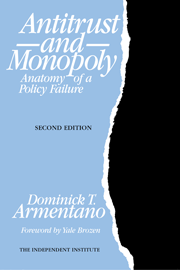Microsoft had licensed its Windows operating system to PC makers on the condition that they also take (at no charge) its Internet browser, Explorer. If the operating system and the browser are in fact separate products, then this arrangement is a so-called “tying agreement” forbidden by a 1995 consent decree between Microsoft and the Department of Justice. But Microsoft claimed that its browser function has now been fully integrated into Windows and that the consent decree explicitly allows it to sell “integrated” products.
On December 11, 1997, District Judge Thomas Jackson ruled against Microsoft and ordered that the company make Windows and its browser available (to PC makers) separately. On June 23, 1998, the appeals court overturned the lower court’s ruling on grounds that the products were indeed “integrated.” Moreover, the court said, “antitrust scholars have long recognized the undesirability of having courts oversee product design.”
Currently Section 1 of the Sherman Act (1890) and Section 3 of the Clayton Act (1914) prohibit tying agreements that “restrain trade substantially.” In addition, there is a vast antitrust case law that forbids firms
with dominant market shares in one product (the tying good) from requiring buyers to take a second product (the tied good) as a condition of sale or lease.
Whether Microsoft’s Window and browser are integrated or “tied” products will be a continuing concern for the courts and the government. Yet beyond that, the legal skirmish raises the more important issue addressed by the appeals court: do we really want government antitrust attorneys and the courts determining the pace and scope of innovation in the computer and telecommunications industry?
Can Microsoft or any other software company continue to integrate computer applications with operating system software? Or is technological change to be put on hold or redirected as we discover what computer products the government or the courts will allow to be sold? Aside from the merits of the antitrust issues, to put such decisions in the hands of government is economic lunacy of the highest order.
Is there any merit to the argument that Microsoft has engaged in illegal tying and the products ought to be “separated” by force of law? The appropriate perspective for any analysis of tying agreements is the self-interest of consumers. Prospective PC buyers are no different from any other consumers. They want as much total product as they can get for the lowest cost. And from a consumer perspective, Windows with (free) Explorer (integrated or tied) is better than Windows without Explorer or with Explorer at some additional cost.
It is incorrect to hold that PC manufacturers are “coerced” into taking Explorer as the government maintains. The simple fact is that PC users want Explorer with their Windows. No PC manufacturer could risk selling its product without including Explorer when other rival PC manufacturers would be free to provide Explorer at no consumer cost. This is the basic reason that PC manufacturers accept Microsoft’s licensing condition that Explorer be included. Competition in the PC market aligns the consumer’s interest with that of Microsoft.
Even accepting that Microsoft “ties” two different products, the antitrust issue is whether the tying restrains trade substantially. Here the government is on weaker ground still. Trade might be restrained if the Microsoft licensing agreement contained a clause forbidding the licensee PC maker from installing “competitive” browsers or dealing in the products of a competitor of Microsoft. Such language was common in several celebrated tying contract cases tried decades ago.
But Microsoft places no outside restraint on PC makers with respect to the installation of competitive products, including browsers. In any case, from a marketing perspective, such contractual restrictions are often counterproductive; in evolving market competition, consumer desire for the best product at the lowest price eventually prevails.
Antitrust enthusiasts have also argued that trade could be restrained if Microsoft’s tying agreement (or product integration) sharply reduced the sales of competitive browsers. But this theory of restraint makes no economic sense. Overall trade is not restrained when some firms do more business while other firms do less. Further, if it is assumed that Microsoft’s browser is actually superior to the competitive browser it replaces–and certainly, its zero price is superior–then overall trade has been expanded, not restrained, by the tie-in or integration.
Netscape Communications Corporation complained that Microsoft has leveraged the success of its Windows operating system into browsers at Netscape’s expense. True, perhaps, but Microsoft ought not be condemned for the consumer acceptance of the total Microsoft package and for the fact that Netscape has no such competitive package. The analogy with baseball would be the rational preference by team management (and fans) for ballplayers who perform well both defensively and offensively. Good defensive players who can’t hit may just never make the majors.
Netscape, apparently, would prefer a so-called “level playing field” where firms sold only operating systems or browsers and where no one had any other advantages. But this is a variation of the silly argument used often to justify protectionism in international trade. Business organizations that can’t compete are always complaining that their competitors have unfair advantages that the law should condemn. That antitrust has now stooped to adopt totally discredited trade theory fallacies is clear evidence of its intellectual bankruptcy.
What started as a “semantic” disagreement over a 1995 consent decree has escalated into a battle over government regulation of product innovation and even over the future of antitrust law in the U.S. The government cannot intelligently micro-manage business innovation and neither can the free market effectively restrain trade. This case against Microsoft should be ended and federal lawmakers should begin a long overdue debate over repeal of all antitrust regulation.








